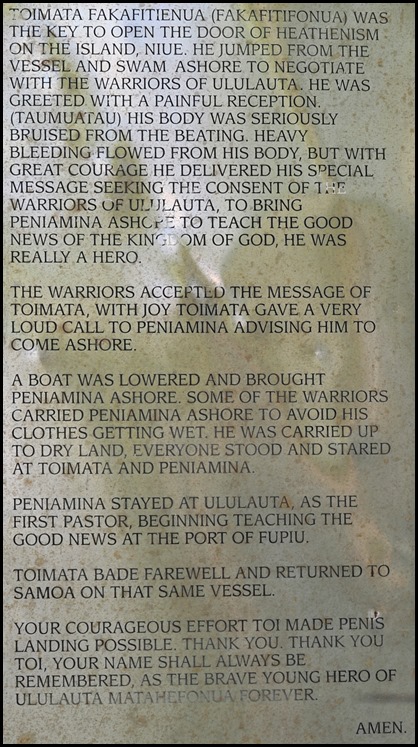Niue

|
Niue 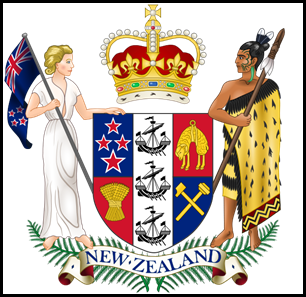
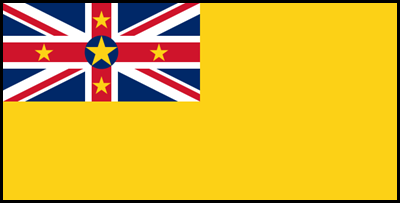 General: Niue
(pronounced New-Ay) is a large upraised coral atoll, and is a standalone land
mass in the centre of a triangle of Polynesian islands made up of Tonga, Western
Samoa and the Cook Islands. Our last island before the International Date Line,
being eleven hours behind GMT. The general formation of the island takes the
shape of two terraces, the lower terrace being ninety feet above sea level, and
the upper terrace about two hundred and twenty feet. The island’s isolation and
coral make-up creates an exciting, rugged coastline and reef, which has provided
us with amazing snorkeling in crystal clear water in many different coves and
chasms. There are no big sandy beaches unlike the rest of Polynesia, this of
course helps with water clarity, down as far as we could see, making the water
quality ranked some of the very best in the world. There are no lakes or streams
on the island so rainfall quickly seeps through the porous coral. The island is
affectionately known as “The Rock”.
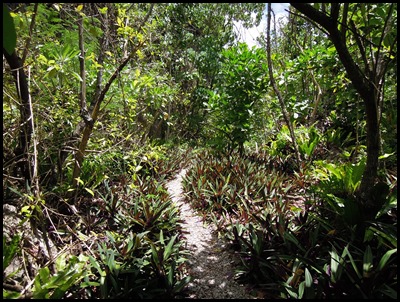
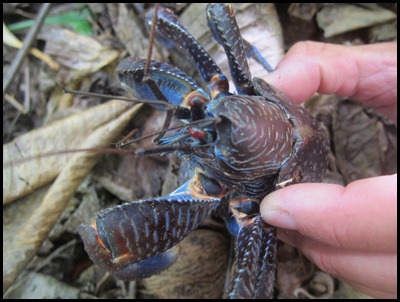 The Huvalu Rain
Forest is home to some incredible indigenous trees and has been
designated as a Conservation Area to protect and conserve the islands’ primary
rain forest and natural flora and fauna – lovely to see so many butterflies.
There are no harmful animals or insects on the island, just some very persistent
flies, that once they call you ‘friend’, remain committed, despite numerous
flicks and warnings. Indeed, gather one at the beginning of a trek and somehow
they managed to stay with us throughout. There are a few mosquitos but they have
the good manners to not like sprays. The sea snakes are numerous and are
extremely venomous, but, are so docile and polite enough to have their teeth so
far back in their mouth, they carry no warnings and pose happily for a
photograph or two. The coconut crab is called Uga –
pronounced Ona.
In
January 2004, Niue was hit by Cyclone
Heta,
which killed two people and caused extensive damage to the entire island,
including wiping out most of the south of the capital,
Alofi.
There is no crime here and the people
are so very welcoming, it makes Niue a very special island and heaven only knows
why it does not get a mention in the 1000 Places to See Book ????
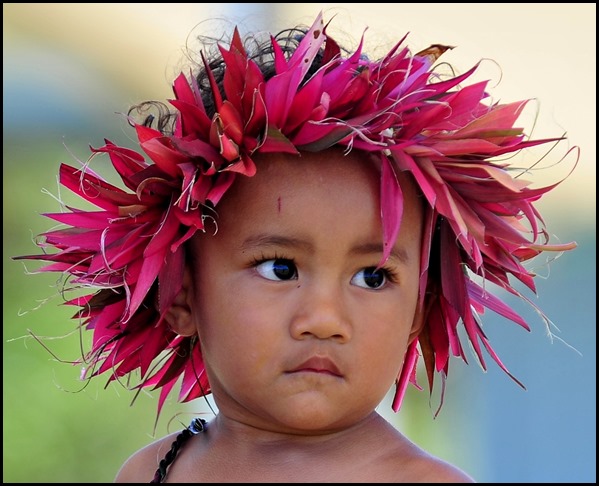 People: Scattered
among fourteen neat, colourful villages, Niue’s less than fifteen hundred
residents enjoy duel citizenship, as a self-governing nation in free association
with New Zealand. They are bi-lingual, speaking both Niuean and English, and
enjoy and independent lifestyle, the highest standard of living in all
Polynesia. The locals are very respectful, genuinely friendly and hospitable to
visitors and have accepted tourism as an important component to their economic
development and well-being. They are well educated and are born happy. Everyone
waved from their cars, everyone we met stopped to chat, welcomed us warmly and
asked about our adventures as soon as they knew we had sailed here.
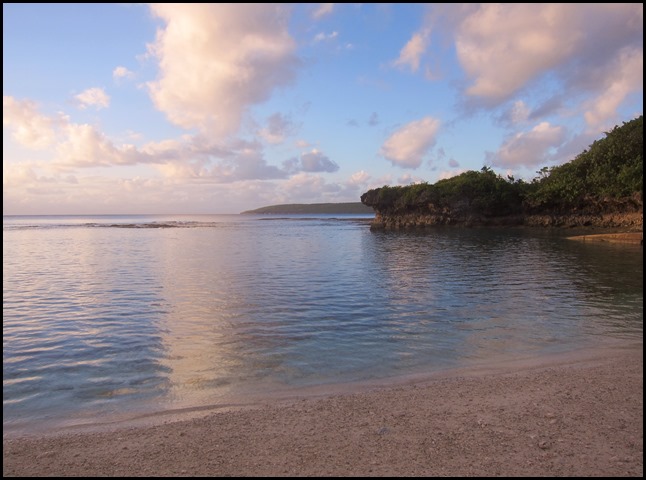 History and
Governance: Niue’s history falls into four defined period:
pre-Christianity, Christianity, the Colonial era and self governing. The
documentation of Niue’s history was primarily oral and passed down through the
generations. It has only been since the period of New Zealand governance that a
great deal of literature has been written. The island is believed to have been
inhabited for over a thousand years. Oral tradition and legend speaks of the
first settlement of Huanaki and Fao, together with the Fire Gods from Fonuagalo,
the Hidden Land. Some authorities believe that the island was settled during two
principal migrations, one from Samoa and one from Tonga with a smaller migration
from Pukapuka in the Cook Islands. In 1774, Captain Cook sighted Niue but was
refused landing by the locals on three different occasions. He then named Niue
“Savage Island”. Legend has it, the natives that "greeted" him were painted in what
appeared to Cook and his crew to be blood. However, the substance on their teeth
was that of the hulahula, a native red banana. For
the next couple of centuries the island was known as Savage Island, until its
original name Niue, which translates as "behold the coconut", regained
use.
Niue chiefs gained British
Protectorate status in 1900 and in 1901 Niue was annexed to New Zealand. In 1974
Niue gained self government in free association with New Zealand and the
government to this day has followed a Westminster-style with a twenty member
assembly. The Premier is selected by the House and the Premier then selects
three other members for Cabinet posts. Niue holds the dubious record of the
highest per capita number of politicians – around one MP for every sixty
people.
In
2003, Niue became the world's first "Wi-Fi
nation", in which free wireless Internet access is provided throughout the
country by The Internet Users
Society-Niue.
We paid thirteen pounds to get a code and after the quality of connection we had
in Palmerston, we were shocked to find it very slow and flaky. Hey, what are we
saying. When we left Panama we had no pre-conceived idea of having wi-fi at all
and have been constantly surprised at the number of islands we could get a
signal, from Beez......
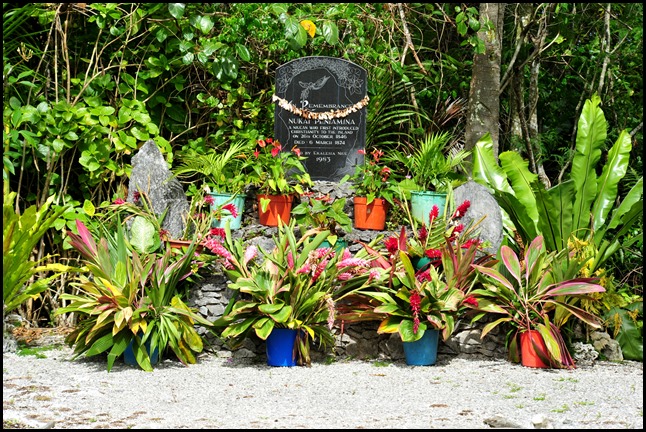 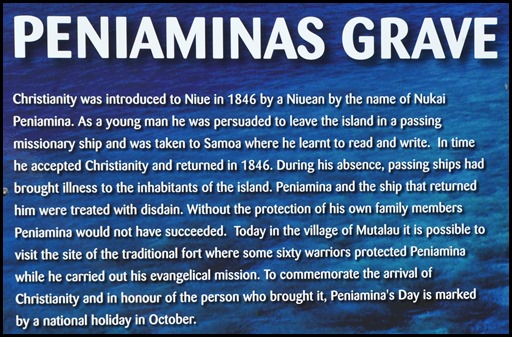 Christianity: Missionaries from the London Missionary Society established Christianity in 1846, arriving on the "Messenger of Peace". After many years of trying to land a European missionary on Niue, a Niuean named Nukai Peniamina was taken to Samoa and trained as a Pastor at the Malua Theological College. Peniamina returned as a missionary with the help of Toimata Fakafitifonua. He was finally allowed to land in Uluvehi Mutalau after a number of attempts in other villages had failed. The Chiefs of Mutalau village allowed Peniamina to land and assigned over sixty warriors to protect him day and night at the fort in Fupiu. Christianity was first taught to the Mutalau people before it was spread to all the villages on Niue; originally other major villages opposed the introduction of Christianity and had sought to kill Peniamina. The people from the village of Hakupu, although the last village to receive Christianity, came and asked for a "word of god"; hence their village was renamed "Ha Kupu Atua" meaning "any word of god", or "Hakupu" for short.
ALL IN ALL A TOP
ISLAND
VERY DIFFERENT, INCREDIBLY
BEAUTIFUL |
